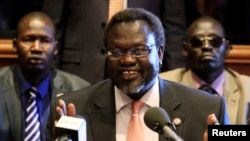The latest round of peace talks between South Sudan's warring factions has come to a standstill, dimming hopes that a comprehensive deal could be reached this week.
South Sudan's government and the rebel opposition failed to meet for scheduled talks in Addis Ababa Thursday, apparently because of opposition complaints about the negotiation process.
The two sides have committed to peace talks to end a conflict that began in mid-December when a political dispute between President Salva Kiir and his main rival Riek Machar turned violent.
Disagreements
But the opposition team has declined to participate in the discussions during the past two days, saying it wants to talk directly about ending hostilities before discussing political reforms. A previous agreement had called for the two sides to form a transitional government by an August 10 deadline, now just a few days away.
“For the government, we believe that we cannot bring peace without the rebels," said South Sudan Information Minister Michael Makuei Lueth, explaining that Juba cannot forge any new deal without the willing involvement of the opposition. "So we're here to negotiate peace and whatever time it takes, as long as the rebels accept to sit with us [at] the table we are capable of bringing peace.”
This is the fifth time since the conflict broke out the two sides have engaged in peace negotiations mediated by the East African regional group IGAD. Three previous cease-fire deals collapsed soon after signing, with each side blaming the other for violating the agreements.
Conflict could spread
Meanwhile, recent reports of violence near the border with Sudan have raised concerns that the conflict could soon expand.
The United Nations says at least five aid workers were killed Monday by a militia in Maban county of Upper Nile state.
The Nuba Reports media outlet, which focuses on the region, reports South Sudanese rebel forces loyal to Riek Machar have also been spotted near the border.
Ryan Boyette, Nuba Reports Executive Director, says that while details are difficult to confirm, it is believed that the opposition is in Maban to receive weapons from Sudan.
“There's no strategy for the [Sudan People's Liberation Movement] in opposition to be that close to the border near that location except to cross the border to get arms or to get supplies.”
South Sudan's government has long accused the rebels of receiving support from Khartoum, a charge the opposition has denied.
Refugees
Any increase in fighting along the Sudan-South Sudan border would put at risk some 125,000 Sudanese refugees living in South Sudan territory, having fled violence in Sudan's Blue Nile State.
Sudan's military also regularly targets rebel groups in the area that fought against Khartoum during the civil war that eventually led to South Sudan's independence in 2011.




